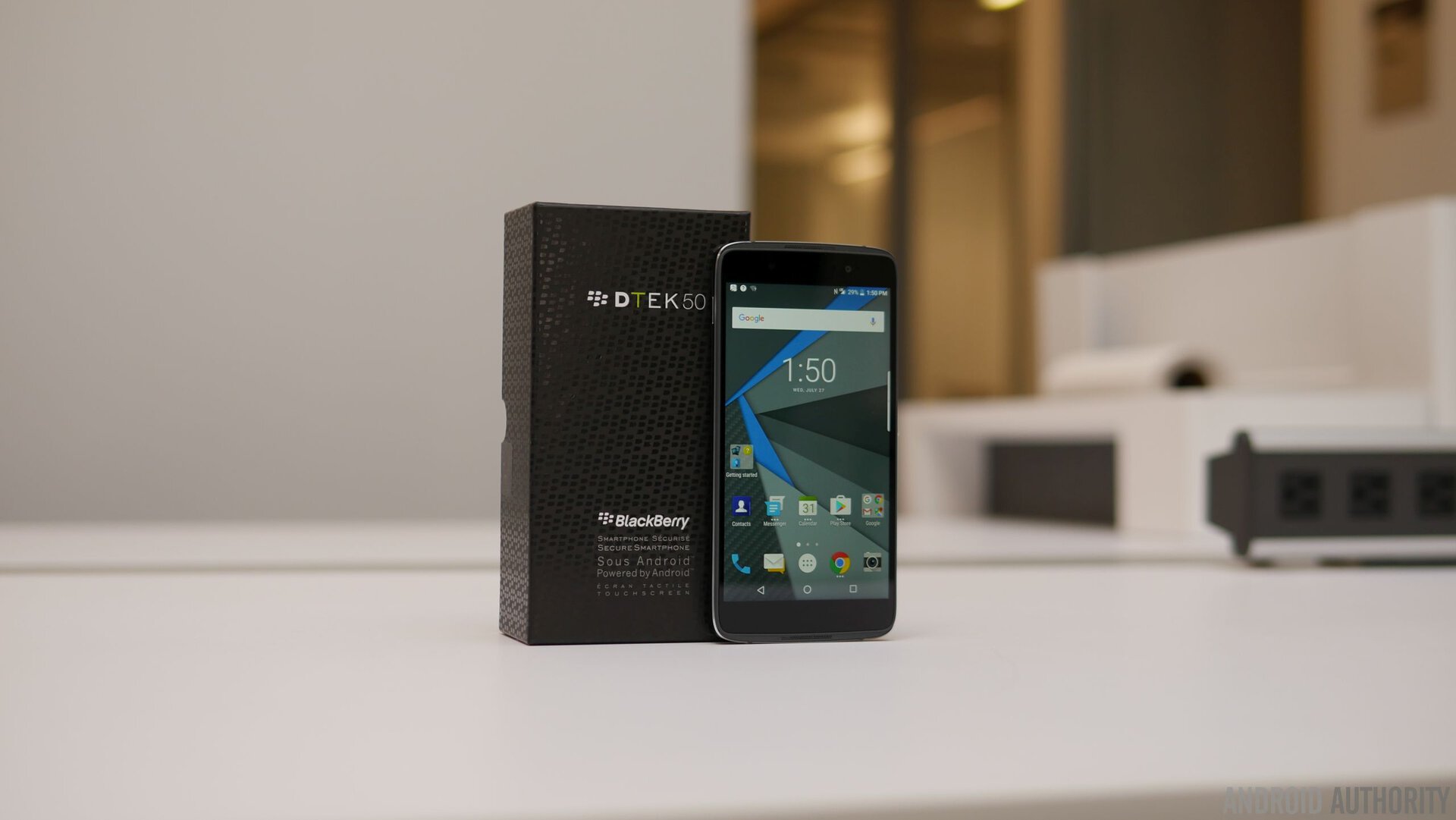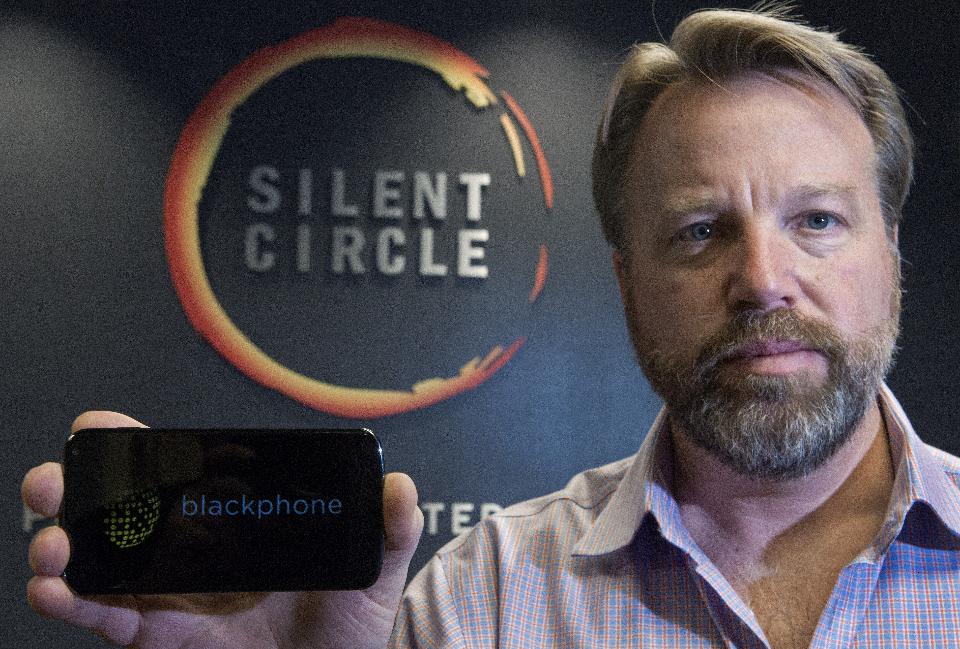Affiliate links on Android Authority may earn us a commission. Learn more.
BlackBerry DTEK50 hands on: The PRIV minus the keyboard, essentially

Smartphone releases from BlackBerry have altogether become infrequent over course of the last few years, as the company has struggled to keep up with the competition and the demand from consumers. In fact, the sheer amount of announcements lately are a far cry from what BlackBerry achieved over 5 years ago. Then again, the landscape has changed significantly since then – even for the company, which has taken on an entirely different identity.
- BlackBerry PRIV review
- BlackBerry DTEK50 announced: everything you need to know
- BlackBerry allegedly working on 3 new Android smartphones, God bless ‘em
Last year’s BlackBerry PRIV was just that, a keyboard-centric smartphone that shockingly ditched the company’s own mobile operating system, BlackBerry 10, opting instead to go full-on Android. Well, they’re following up that device with yet another Android-powered one, the DTEK50, which might have one of the lamest names in phone history, but it’s actually being targeted towards enterprise and business users primarily – signaling yet another shift that might have implications down the road.
Design
During its announcement, BlackBerry was being a bit coy at the beginning about the DTEK50’s design, seeing that many folks believed it was just a rebranded Alcatel Idol 4. Well, that’s confirmed because the company reached out to TCL for the design. This, obviously, doesn’t have the design language that fans will view as typical BlackBerry. That’s neither a good or bad thing, seeing that the design is lightweight and sleek – while also marrying form and functionality to the mix.
Given its price point, the look and feel of the phone is what you’d expect from a phone stickered with a $299 cost. The rear casing in particular, manages to keep a clean finish with its rubbery textured surface, which also adds to it being extremely grippy when it’s held. Adding on to that, there’s an accented metal trim bezel of some kind that complements its no-frills design approach.
Let’s be real here for a moment, there’s nothing really special with the design, given that it’s almost an exact facsimile to the Alcatel Idol 4. The more important thing, though, is the company’s decision to outsource the task of designing the phone to another company – given that BlackBerry has a strong reputation when it comes to designing its phones in-house. All of this is yet more of an indication that the company is setting shifting its focus more on software rather than hardware.
Display
What else is there to say about the screen here, other than the obvious specs listing? Just as refresher, the DTEK50 features a 5.2-inch 1080p display of some kind with an oleophobic coating and a 24-bit color depth. To us, it seems more like an LCD screen than AMOLED, seeing that the color black doesn’t achieve the same pitch black color seen with AMOLED. Honestly, even though the specs are indicative of its pricing and target demographics, there’s not a whole lot to complain about from our quick look.
It’s detailed, offers decent clarity at all angles, and the brightness output appears to be more than sufficient. However, it’s apparent that BlackBerry recognizes the popularity of an all-touch smartphone, so it feels right for this phone to tackle that form factor – as opposed to being another hybrid of some kind.
Performance and Hardware
Being targeted towards enterprise and business owners, it’s pretty forgiving that the DTEK50 is outfitted with meager specs – that includes an octa-core Snapdragon 617 SoC and 3GB of RAM. Now, this combination won’t raise many eyebrows in a room, but in reality, this phone doesn’t need all the horsepower that flagships claim to deliver. Most folks who are even thinking about buying this phone are probably more interested in the software and security. Still, at least the phone manages to exhibit a tolerant level of responsiveness with basic tasks.
16GB of internal storage can be seen as paltry to some nowadays, but there’s no need to complain a whole lot because of its lower price point – and that it can be supplemented thanks to its microSD card slot.
Security is undeniably at the top of the list with this phone, but it still doesn’t offer any kind of biometric security feature of some kind; say like the finger print sensor. We asked them about this, and the response wasn’t all that surprising to us. While there’s security on both the software and hardware level, making it tough to crack into, the company chose not to go with a finger print sensor due to the chance of compromising the phone’s cost. Well, that’s a bit tough to swallow, especially now that we have sub-$100 phones with them.
Camera
Again, there’s really nothing that’s too glaring with the DTEK50’s cameras. When it comes to the hardware, the 13MP rear camera with LED flash and front-facing 8MP camera seem like legitimate contenders. With the use of the phone’s convenience key, a feature that BlackBerry seemingly loves to say they’ve brought back, you can program the button on the right side of the phone to function as an action – so in this case, it can be used to launch the camera app.
Speaking of the camera app, it’s pretty ordinary in our opinion. Of course, the automatic mode is there to get your quick shots, as well as a manual mode for those who want more control of their shots. Meanwhile, video recording tops out at 1080p resolution at 60 FPS. We haven’t spent a lot of time yet with the phone, but we’re really curious to see how these cameras perform.
Software
Emphasizing its legendary reputation with security and privacy, the BlackBerry DTEK50 follows in the same footsteps as the PRIV before it by running Android and the company’s DTEK software. That software oversees what’s happening to the phone, what services and hardware are being accessed by apps, and also informs you about the phone’s overall security status. At the core of it all, the Android experience is a welcomed one, but it’s enhanced by the protection of DTEK.

The problem here, however, is that there’s nothing that makes this Android experience from BlackBerry any different from what we saw with the PRIV last year. Quite frankly, we’re told it’s essentially the same – save for the convenience key integration now with the DTEK50. And that’s the thing, there’s not much of a compelling reason with the phone besides its design, as it’s slimmer and more manageable to handle than the PRIV.
Conclusion
We come away from our hands on experience feeling that the DTEK50 is quite frankly the keyboard-less version of the PRIV. While that’s a generality on its own, there’s still the matter of specs – wherein the PRIV is and will continue to be largely the superior spec’d one. There’s still hope for the DTEK50, even though the software experience is similar and unchanged, seeing that its design will certainly appeal to the masses with its all-touch centricity.
- BlackBerry PRIV review
- BlackBerry DTEK50 announced: everything you need to know
- BlackBerry allegedly working on 3 new Android smartphones, God bless ‘em
Price-wise, the DTEK50 has an advantage because it’s priced lower at $299 when it officially goes on sale. For a BlackBerry, that’s an especially aggressive price to be at right from the onset. It’ll naturally help in all the right areas, but knowing what’s out there already and within the same caliber, the DTEK50 will be playing to a tough audience.
Those who are particular about their phone’s security will surely want to keep this one in consideration, but for a little bit more, there’s also the PRIV. Decisions, decisions indeed… but which would you choose? Let us know your views in the comments below!